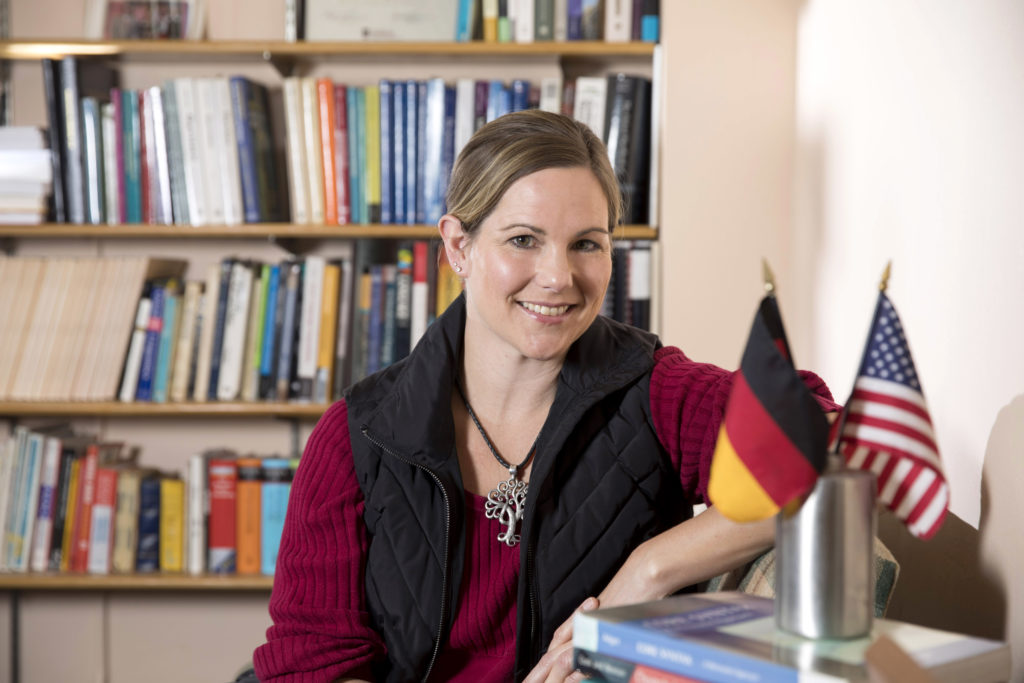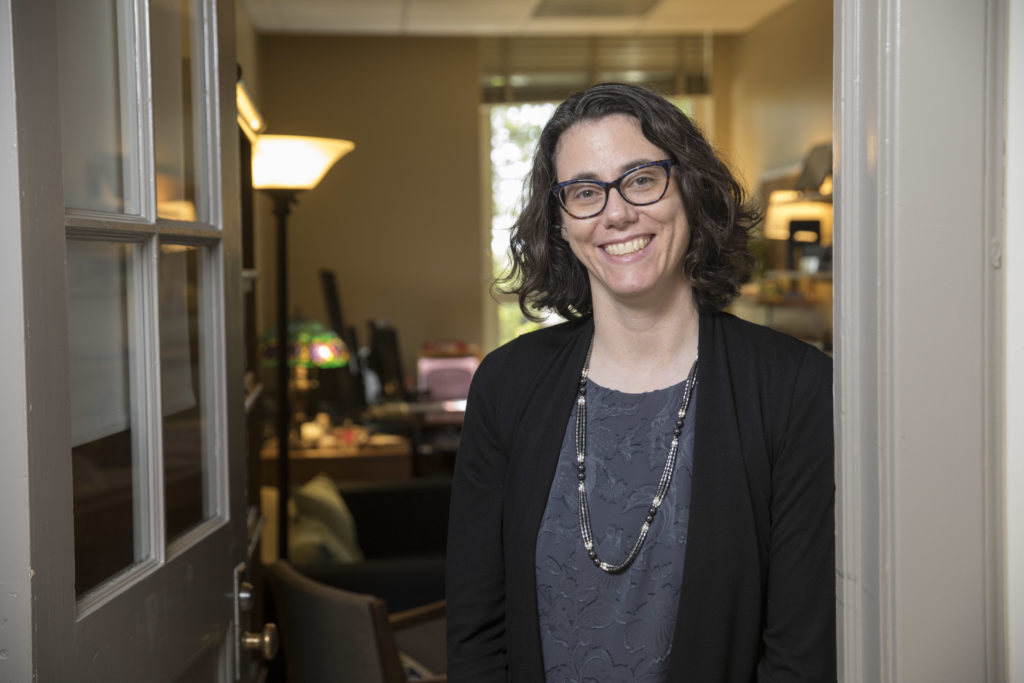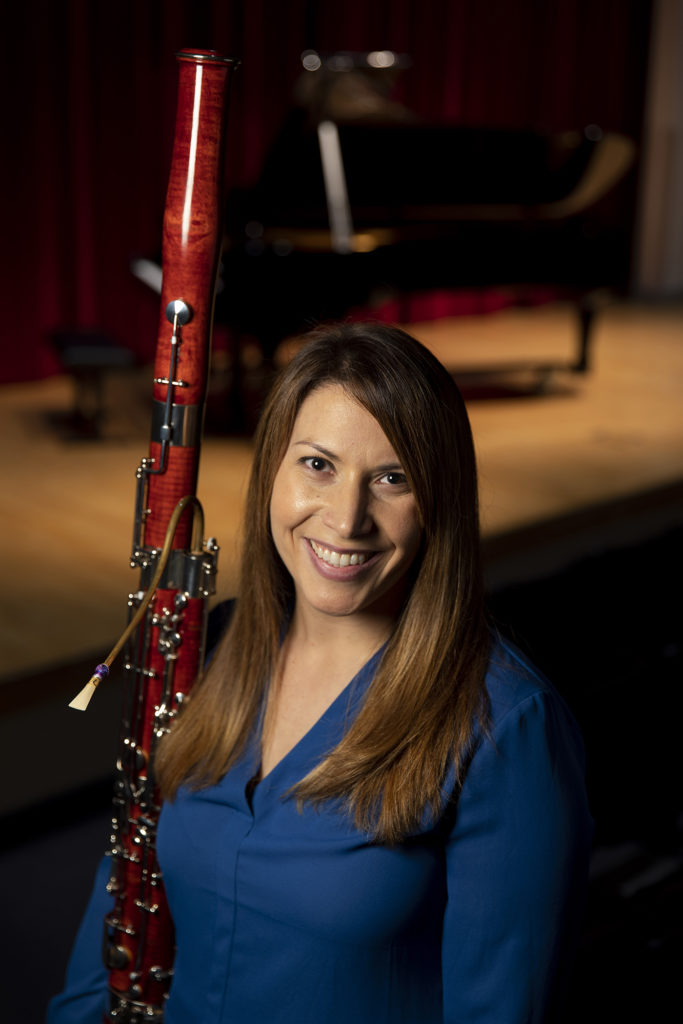Three UGA faculty members will receive Richard B. Russell Awards for Excellence in Undergraduate Teaching April 1 at the 2019 Faculty Recognition Banquet. Russell Awards recognize outstanding teaching by faculty early in their academic careers. Award recipients receive $10,000. The Richard B. Russell Foundation in Atlanta supports the program.

Vera Lee-Schoenfeld
Associate Professor of Linguistics and Adjunct Professor in Germanic and Slavic Studies
Franklin College of Arts and Sciences
Vera Lee-Schoenfeld’s teaching philosophy is influenced by what she learned from one of her graduate school professors.
“I follow UC Santa Cruz professor Jim McCloskey’s teaching philosophy,” Lee-Schoenfeld said. “The teaching we do in linguistics should impart to students not a body of established results, but rather an analytical method—how to perceive a pattern in a body of observation, how to construct an understanding of that pattern, how to subject that understanding to skeptical scrutiny and how to build incrementally on that initial foundation.”
In her classes, Lee-Schoenfeld employs the discovery method, which does not involve the use of a textbook. Instead, students draw their conclusions from given data sets with guidance from previous lectures. One result of this teaching method is that students become interactive participants in the learning process.
“I enjoyed the raw intensity of critical thinking involved in completing each and every homework assignment,” a former student wrote in a class evaluation. “Analyzing completely unfamiliar languages was a blast, especially given that the grading depended entirely upon the style of argumentation submitted by the student, rather than a prescriptive ‘right answer.’ ”
Lee-Schoenfeld’s career in linguistics started via the language-teaching route. She taught French to high school students, English as a second language to international scholars, and German—her native language—at the collegiate level.
“I have since shifted gears and become a theoretical linguist, focusing not on prescriptive grammar rules, which are taught to second-language learners, but on descriptive rules and universal principles, which are posited by linguists to account for native speakers’ implicit knowledge of their language, i.e. how they actually speak,” she said.
In addition to her regular teaching assignments, Lee-Schoenfeld took the lead on revising the online version of an introductory linguistics course. It was improved by the addition of new video lectures and assignments and a reorganization of course topics to make the class more engaging and accessible. As a result of these revisions, 200 students took the class last summer.
Lee-Schoenfeld also invests in her students outside the classroom. In addition to mentoring a number of CURO students, she has used a research collaboration with Gabriele Diewald to establish an exchange program for undergraduate students at UGA and the University of Hannover in Germany, where Diewald is a faculty member. In its most recent iteration, the program resulted in a formal partnership funded by the German Academic Exchange Council.
Besides the rewarding experience of being in charge of an integral part of students’ education and the pleasure of establishing a good rapport with students, another benefit of teaching, according to Lee-Schoenfeld, is the chance to learn or re-learn the core aspects of the given subject matter.
“I can think of no better way to deepen one’s understanding of a difficult concept than to re-present it to a group of open and capable, but nonetheless skeptical, students,” she said.
—Juliett Dinkins

Sarah Shannon
Assistant Professor of Sociology
Franklin College of Arts and Sciences
Unique learning opportunities that take Sarah Shannon’s research and classroom experience into the community characterize her commitment to instruction.
The first UGA professor to receive “Inside-Out” certification, Shannon’s innovative course brings students together with inmates at the local jail in a shared learning environment. Her dedication to training in the Temple University-based program and as a UGA Service-Learning Fellow set the stage for Shannon to create the collaborative partnership with Athens-Clarke County.
The efforts have borne fruit, as some of UGA’s highest achieving students rank Shannon’s “Inside-Out” class the most meaningful academic and social experience of their time at the university.
“I studied alongside students, many of whom hadn’t even completed high school, who used their firsthand experiences with the criminal justice system to push our class discussions to heights I could never have imagined prior to taking the ‘Inside-Out’ course,” said Foundation Fellow Kavi Pandian.
Briana Clark, currently a student at Yale law school, said, “This course was the single most transformative educational experience in my life.”
A 2014-2016 Lilly Teaching Fellow, Shannon has trained and mentored 13 undergraduate students through the CURO program. Inspiring independent research through hands-on learning, including qualitative fieldwork and quantitative data collection, Shannon fosters a love of research that is an extension of her own scholarly passion. Her investigations into economic and racial disparities in felony conviction rates in the U.S. fuel policy discussions far beyond her field. These, in turn, inspire her work even in the traditional classroom setting. Sociology department head Jody Clay-Warner said that Shannon’s “Communities and Crime” and “Criminology” classes are consistently among the highest-rated undergraduate courses in the department.
Shannon’s courses are brimming with innovation and thoughtful design, according to James Coverdill, associate professor of sociology and undergraduate coordinator.
“The variety of materials she uses, including standard textbooks, academic articles and research books, but also material from podcasts, the popular press and television, make for a wonderful mix of tempos and expectations, all of which keep students engaged and enthusiastic,” he said.
“My teaching philosophy is rooted in Michael Burawoy’s observation that ‘… students are our first public for they carry sociology into all walks of life,’ and guided by John Dewey’s assertion that ‘understanding, by its very nature, is related to action.’ I am keenly aware that the undergraduate students who pass through my classrooms will be ‘carrying sociology’ into their careers in the criminal justice system with the potential to impact policies and the lives of others in substantial ways,” Shannon said.
This sense of calling and responsibility informs her charge to students to engage with theories and empirical studies that explain the causes of crime, the social forces that shape criminal punishment and the effects that each have on individuals and communities.
“Dr. Shannon not only impacted my life, but she also changed the direction of my career,” said Risa Josephine Matsumura, who currently serves in the Peace Corps in the Kyrgyz Republic.
—Alan Flurry

Amy Pollard
Associate Professor of Music
Franklin College of Arts and Sciences
A creative approach to engaging students, including an annual workshop and the development of new courses, has led to Amy Pollard’s great effectiveness and success.
Music school faculty serve students as private tutors, theorists, ensemble coaches and mentors all while maintaining their own professional schedule as musicians. The nation’s most talented music students often make their college choice based on a single factor: who teaches their instrument. Pollard’s bassoon studio has some of the best flocking to UGA to train in a double-reed instrument notorious for its recruiting challenges.
Pollard’s teaching philosophy incudes a comprehensive approach, individualized as much as possible.
“As an applied music professor, I am fortunate to most often work with students one at a time in private lessons,” she said. “My greatest goal as an educator is to teach students to teach themselves. Fostering student creativity is essential so that they can each discover their own voice as a musician, using their own life experiences to provide meaning and personal relevance in conveying emotions through the instrument.”
Pollard’s reputation as a teacher has led to invitations to give lessons and master classes at Rice University, the University of Texas, Michigan State University, Florida State University and LSU, among others. She also has taught at the Interlochen Advanced Bassoon Institute in Michigan.
“As effective and engaged as she has been as a bassoon teacher, her work in other areas of pedagogical need in the school have been foundational to our success and are equally compelling,” said Dale Monson, Hodgson School of Music director. “These include her leadership in such fields as music technology, wellness (physical, emotional), performance anxiety and career development.”
Pollard’s innovative approach to pedagogy led her to champion an ambitious new cross-studio effort, now in its third year. X-Week is an experience designed by Pollard in which Hodgson School students trade teachers for a week—an approach that has been met with enthusiasm from both sides of the music stand.
“This interdisciplinary program has been an enormous success with faculty and staff, and in addition to its instructional benefits, has also strengthened relationships and a sense of common purpose in the HHSOM,” said Peter Jutras, professor of piano.
Jutras, other faculty and students cite additional courses developed by Pollard and their impact on the entire school. Created alongside faculty colleagues David Zerkel and Connie Frigo, “Music in the Real World” is now required of all undergraduates and focuses on skills for professional success in a constantly evolving music industry. Pollard’s First-Year Odyssey seminar on performance anxiety has helped scores of students in a field where public performance and presence are crucial skills.
“Dr. Pollard is certainly efficient, analytical, talented and highly intelligent, but it is her commitment to her students and reverence for education that set her apart,” said music performance major Jackson Thompson. “I think I can speak for all of her students when I say that we are better for having known her.”
—Alan Flurry


